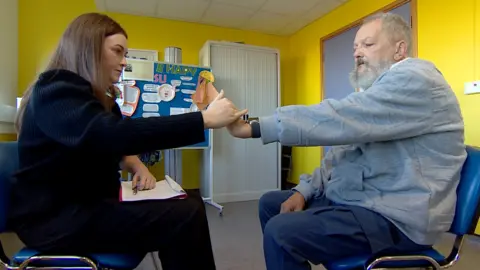Stroke patients test new nerve stimulation therapy
 BBC
BBCTwo years ago Michael Koers was a fit and healthy 62-year-old - a courier who liked to keep busy at the family allotment.
But things changed one night when he suffered a stroke that's left him with issues down his left side.
We're with him at King's College Hospital in Camberwell, south London, as he comes in to see if he'll be accepted for a new trial.
If he is, medics will aim to help give him more movement in his arm and hand.

There are plenty of tests here at the hospital to see how much he can move his left arm and hand.
"It's not like I was an inactive person. I just woke up in the middle of the night having a stroke, simple as that," Michael says.
"It's been a total disruption. There's no way I can continue with the role I was doing. I've always been a very hands-on person, an outdoors type, but the stroke's limited that completely," he adds.
Ava Coughlan, an occupational therapist, is here to test Michael to see if he is a good fit for the trial.
"Lift you arm," she tells him. "Turn your wrist. Try and hold on to the piece of paper while I try to take it."
If he's accepted on the trial, he will be given a device that's a little bit like a hearing aid.
It would be placed in his ear and attached to a device that would send electrical signals to his vagus nerve, which carries signals between the brain, heart and digestive system.
The hope is that the device would help him move his arm and hand more easily.

On a similar type of programme in the United States, patients had a similar device that was surgically implanted.
The therapy then had to be administered under hospital supervision by a therapist, who triggered the stimulation.
This new technique needs only a portable device, with patients wearing a watch-like monitor linked to a mobile phone to gather the results.
It's used while patients do rehabilitation exercises. The trial here in the UK is to see if it works as well as the US scheme - and could mean patients not having to undergo surgery.
"This is a very interesting trial," Michael says. "Even if I don't make it on to it I think it's something that other people that have strokes could benefit from.
"If I'm accepted, hopefully they can use what they learn for other people in the future."
'It's exciting'
The trial at King College Hospital is part of a wider project being run by Sheffield Teaching Hospitals and the University of Sheffield.
Here in London, it's led by consultant occupational therapist Bill Tahtis. He tells me that initial studies have shown that when people receive stimulation from the device, it can speed up the rehabilitation process.
He says: "We think this is something on top of the therapy we provide that will be really beneficial to patients."
At the moment, Bill and his team are trying to recruit more people to the study, seeking patients who have had a stroke between six months and 10 years ago.
He says: "We don't know whether the treatment will be effective using this mechanism and we don't know which specific subgroups it will work for."
He adds: "It's exciting, we feel it's got great promise but we're testing to see if it does."
For Michael, it's good news.
After an hour or so of testing, he's been accepted on to the trial and given a lot of exercises to do every day when he gets home, using the new device.
He laughs as he leaves. "I don't know what I passed... But I passed something!"
Listen to the best of BBC Radio London on Sounds and follow BBC London on Facebook, X and Instagram. Send your story ideas to [email protected]
